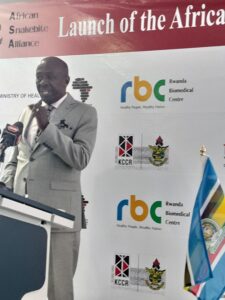
Leading snakebite experts from Liverpool School of Tropical Medicine (LSTM), Ghana, Rwanda, Kenya, and Eswatini are launching the African Snakebite Alliance (ASA) to tackle deadly snakebite envenoming.
The launch of the ASA will strengthen the international scientific community by linking up with policymakers and community groups in Africa, aiming to improve health outcomes for people affected by snakebite envenoming and address evidence gaps in policy and practice.
Coordination between these groups aims to ensure new research leads to changes on the ground. This will be crucial for meeting the World Health Organisation’s (WHO) goal of halving snakebite deaths and disability worldwide by 2030.
Snakebite envenoming kills between 81,000 and 138,000 people annually and a further 400,000 surviving victims are left with permanent physical disabilities and disfigurements. Up to one-third of these deaths occur in sub-Saharan Africa, and individuals affected by snakebite often reside in some of the most disadvantaged rural communities across Africa..
Members of the ASA come from LSTM, KIPRE, University of Global Health Equity (UGHE), Kumasi Centre for Collaborative Research in Tropical Medicine (KCCR), Eswatini Antivenom Foundation (EAF) and Rwanda Biomedical Center (RBC) with funding provided by the Wellcome Trust.
ASA Deputy Director Dr George Omondi from the Kenyan Institute of Primate Research (KIPRE) said: “We are incredibly excited to launch this new alliance dedicated to fostering a robust portfolio of impactful research and policy towards improving health outcomes for snakebite victims.”
Despite the myriad problems caused by snakebite, the WHO classifies snakebite envenoming as a neglected tropical disease due to the lack of global resources dedicated to tackling it, including the need for high quality research.
The ASA has set three objectives to fill the research and evidence gap in snakebite envenoming: to undertake high-quality research relevant to improving health outcomes for people affected by snakebite in Africa, to develop systems to support national and regional bodies in Africa to incorporate research evidence into decision-making in policy and practice, and to develop and support a sustainable and cross-disciplinary capacity for snakebite research in Africa.
ASA Director Professor Ymkje Stienstra, from LSTM, said: “The ASA will pick up clinical and public health research questions based on the input from communities and policymakers. The findings will translate into prevention of snakebites and ways to reduce the damage caused by them.”
Initial research by members of the Alliance’s member organisations identified some of the barriers to tackling the burden of snakebite in sub-Saharan Africa, including limited funds, lack of relevant data, and from the need to increase engagement with policymakers, all of which will be addressed by the development of the ASA as a research and policy hub.
As well as conducting research, the ASA wants to promote research on snakebite envenoming via open grants, including creating opportunities for postdoctoral researchers in Africa.
Information on how to apply for these grants will appear on the ASA website, and further updates will be published on its X (Twitter) account.
About the African Snakebite Alliance
Members of the ASA include:
Professor David Lalloo and Professor Ymkje Stienstra from Liverpool School of Tropical Medicine Dr George Omondi from Kenyan Institute of Primate Research,
Dr Janna Schurer from University of Global Health Equity.
Dr John Amuasi from Kumasi Centre for Collaborative Research in Tropical Medicine
Dr Sara Padidar from Eswatini Antivenom Foundation,
Jean Bosco Mbonigaba from Rwanda Biomedical Center.






